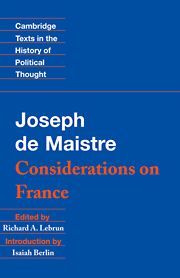Book contents
- Frontmatter
- Contents
- Note on the Introduction
- Introduction
- Chronology
- Bibliography
- Note on the text
- Considerations on France
- 1 Of Revolutions
- 2 Reflections on the Ways of Providence in the French Revolution
- 3 On the Violent Destruction of the Human Species
- 4 Can the French Republic Last?
- 5 The French Revolution Considered in its Antireligious Character
- 6 On Divine Influence in Political Constitutions
- 7 Evidence of the Incapacity of the Present French Government
- 8 Of the Old French Constitution
- 9 How Will the Counter-Revolution Happen if it Comes?
- 10 On the Supposed Dangers of a Counter-Revolution
- 11 From a History of the French Revolution by David Hume
- Postscript
- Index
- Cambridge texts in the history of political thought
11 - From a History of the French Revolution by David Hume
Published online by Cambridge University Press: 05 June 2012
- Frontmatter
- Contents
- Note on the Introduction
- Introduction
- Chronology
- Bibliography
- Note on the text
- Considerations on France
- 1 Of Revolutions
- 2 Reflections on the Ways of Providence in the French Revolution
- 3 On the Violent Destruction of the Human Species
- 4 Can the French Republic Last?
- 5 The French Revolution Considered in its Antireligious Character
- 6 On Divine Influence in Political Constitutions
- 7 Evidence of the Incapacity of the Present French Government
- 8 Of the Old French Constitution
- 9 How Will the Counter-Revolution Happen if it Comes?
- 10 On the Supposed Dangers of a Counter-Revolution
- 11 From a History of the French Revolution by David Hume
- Postscript
- Index
- Cambridge texts in the history of political thought
Summary
Eadem Mutata Resurgo
[I rise again, transformed, but the same]
The Long Parliament declared by a solemn oath that it could not be dissolved (p. 181). To assure its power, it never ceased stirring up the people, sometimes inflaming their minds by cunning speeches (p. 176), sometimes causing petitions in support of the Revolution to be sent in from all parts of the realm (p. 133). Abuse in the press was carried to extremes; numerous clubs everywhere produced noisy tumults; fanaticism had its own language, it was a new jargon invented by the fury and hypocrisy of the times (p. 131). Every day produced some new harangue on past grievances (p. 129). All the old institutions were overthrown one after the other (pp. 125, 188). The self-denial ordinance and the new model bill completely disorganized the army and gave it a new form and new composition which forced many old officers to resign their commissions (p. 13). Every kind of crime was attributed to the royalists (p. 148), and the art of deceiving and frightening the people was carried to the point of making them believe that the royalists had mined the Thames (p. 177). No king, no nobility, universal equality, became the watchwords (p. 87). But in the midst of this popular effervescence, there now appeared a separate party, the Independents, an enthusiastic sect which ended by enslaving the Long Parliament (p. 186).
- Type
- Chapter
- Information
- Maistre: Considerations on France , pp. 106 - 121Publisher: Cambridge University PressPrint publication year: 1994



